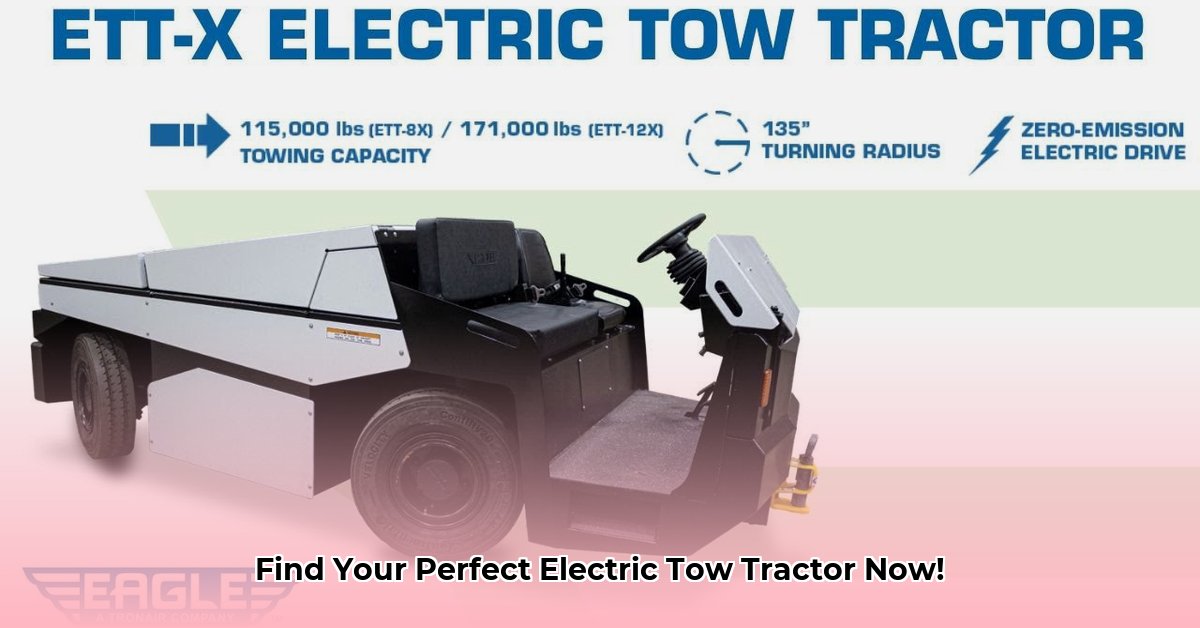
Electric Tow Tractors: Revolutionizing Warehouse Efficiency
Moving heavy loads efficiently is crucial for any warehouse or manufacturing facility. Electric tow tractors offer a significant upgrade over traditional gas-powered models, providing enhanced efficiency, reduced environmental impact, and improved operator comfort. This guide provides a comprehensive overview, empowering you to select and utilize electric tow tractors effectively. For more on electric vehicles, check out this helpful resource.
Key Features and Benefits of Electric Tow Tractors
Electric tow tractors offer numerous advantages compared to their gas-powered counterparts:
- Increased Efficiency: Advanced AC motors (like those found in Hyster and Toyota models) provide powerful performance with reduced maintenance needs. This translates to less downtime and higher productivity.
- Enhanced Ergonomics: Modern designs prioritize operator comfort with features like improved controls, comfortable seating, and easier access points. This leads to reduced operator fatigue and improved safety.
- Adaptable Versatility: Electric tow tractors often feature adaptable hitches, accommodating a wide variety of loads and containers. This flexibility is invaluable in diverse material handling applications.
- Reduced Operating Costs: Lower fuel consumption, minimal maintenance, and reduced environmental impact contribute to significant long-term cost savings.
Types of Electric Tow Tractors: Capacity, Application, and Features
Electric tow tractors are categorized based on several key parameters:
- Capacity: From handling light loads in small warehouses to moving heavy materials in manufacturing plants, tractors are available for various needs. Smaller units (e.g., up to 5,000 lbs) excel in tight spaces, while larger models (10,000+ lbs) are suitable for higher-capacity tasks.
- Application: Warehouse environments typically benefit from highly maneuverable tractors with smaller footprints. Manufacturing settings may demand higher load capacities and potentially rugged construction for varied terrains.
- Features: Programmable controls allow customization for optimal performance in complex environments. Other features to consider include specialized hitches, advanced safety systems, and operator assistance technologies.
Selecting the Right Electric Tow Tractor: A Practical Guide
Choosing the right electric tow tractor requires careful consideration of several factors:
Needs Assessment: Begin by defining your specific requirements. What are the typical load weights? What are the distances loads need to travel? What is your budget? Understanding these factors is paramount. A thorough needs assessment ensures you choose a tractor that matches your operational requirements.
Specification Comparison: Beyond towing capacity, compare battery life, charging time, turning radius, and overall maneuverability. Longer battery life minimizes interruptions and enhances workflow.
Feature Prioritization: Identify the essential features—programmable controls, specialized hitches, advanced safety systems—that will maximize efficiency and safety in your specific environment.
Expert Consultation: Seeking advice from material handling specialists can be invaluable. Their expertise helps navigate complex choices and ensures optimal equipment selection.
Total Cost of Ownership (TCO) Analysis: Consider the long-term costs, including battery replacements, maintenance, and energy consumption. A complete TCO analysis facilitates informed, long-term decision-making.
(Table of Common Specifications – Note: These are illustrative examples; actual specifications vary widely by manufacturer and model. Consult manufacturers for precise details.)
| Feature | Small Capacity Model | Medium Capacity Model | Heavy Capacity Model |
|---|---|---|---|
| Towing Capacity (lbs) | Up to 5,000 | 5,000 - 10,000 | 10,000+ |
| Battery Type | Lithium-ion (common) | Lithium-ion (common) | Lithium-ion (common) |
| Maneuverability | Excellent, tight turning radius | Good, suitable for wider aisles | Adequate, might require wider aisles |
| Typical Applications | Smaller warehouses, retail environments | Larger warehouses, distribution centers | Manufacturing plants, large DCs |
Operational Considerations: Safety, Training, and Maintenance
Safe and efficient operation requires careful attention to several factors:
Operator Training: Invest in proper training to ensure safe operation and maximize efficiency. Skilled operators contribute significantly to accident prevention and productivity.
Regular Maintenance: Adhere to the manufacturer's recommended maintenance schedule. Regular inspections and preventative maintenance minimize downtime and extend the lifespan of the equipment.
Battery Management: Proper charging and storage practices are crucial for optimal battery lifespan and performance. Correct battery management is essential for maximizing uptime and reducing battery-related issues.
Safety Procedures: Implement clear safety protocols to mitigate risks and protect workers. Prioritizing safety ensures a secure working environment.
Future Trends in Electric Tow Tractors
Advancements in battery technology promise longer operating times and faster charging. The introduction of autonomous towing systems is expected to greatly enhance efficiency and reduce labor costs. Improved software and connectivity offer enhanced fleet management and data-driven insights.
Conclusion: Invest in Efficiency and Long-Term Success
Selecting the right electric tow tractor requires careful planning and consideration. By following the steps outlined above, you can significantly upgrade your material handling operations, ensuring increased efficiency, improved safety, and long-term cost savings. Remember to consult with experts and thoroughly investigate your needs to make the most informed purchase decision.